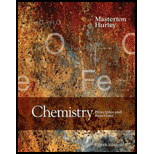
Concept explainers
(a)
Interpretation:
The simplest formula of the compounds is to be written.
Concept introduction:
The simplest molecular formula is also known as the empirical formula for any compound. It represents the simplest ratio of element present in a compound. The formula is written in the form of element symbol and its mole ratio in its subscript.
The molecular formula is obtained from empirical formula as:
(b)
Interpretation:
The structural formula is to be drawn for the complex formed.
Concept introduction:
The geometry of any complex is the spatial arrangement of ligands around the central metal cation. The chemical and most of the physical properties of the complex depends on this geometrical arrangement only. The number of ligands attached to the metal cation shows its co-ordination number.
Want to see the full answer?
Check out a sample textbook solution
Chapter 19 Solutions
Chemistry: Principles and Reactions
- Four different octahedral chromium coordination compounds exist that all have the same oxidation state for chromium and have H2O and Cl as the ligands and counterions. When 1 mole of each of the four compounds is dissolved in water, how many moles of silver chloride will precipitate upon addition of excess AgNO3?arrow_forward(a) Name this coordination compound: [Ag(NH3)2]NO3. (b) Write the formula of pentaaquaisothiocyanatoiron(III) chloride.arrow_forwardAn aqueous solution of [Rh(C2O4)3]3− is yellow. Predict the approximate wavelength and predominant color of light absorbed by the complex.arrow_forward
 Chemistry: Principles and ReactionsChemistryISBN:9781305079373Author:William L. Masterton, Cecile N. HurleyPublisher:Cengage Learning
Chemistry: Principles and ReactionsChemistryISBN:9781305079373Author:William L. Masterton, Cecile N. HurleyPublisher:Cengage Learning Chemistry: The Molecular ScienceChemistryISBN:9781285199047Author:John W. Moore, Conrad L. StanitskiPublisher:Cengage Learning
Chemistry: The Molecular ScienceChemistryISBN:9781285199047Author:John W. Moore, Conrad L. StanitskiPublisher:Cengage Learning Principles of Modern ChemistryChemistryISBN:9781305079113Author:David W. Oxtoby, H. Pat Gillis, Laurie J. ButlerPublisher:Cengage Learning
Principles of Modern ChemistryChemistryISBN:9781305079113Author:David W. Oxtoby, H. Pat Gillis, Laurie J. ButlerPublisher:Cengage Learning Chemistry: An Atoms First ApproachChemistryISBN:9781305079243Author:Steven S. Zumdahl, Susan A. ZumdahlPublisher:Cengage Learning
Chemistry: An Atoms First ApproachChemistryISBN:9781305079243Author:Steven S. Zumdahl, Susan A. ZumdahlPublisher:Cengage Learning
 ChemistryChemistryISBN:9781305957404Author:Steven S. Zumdahl, Susan A. Zumdahl, Donald J. DeCostePublisher:Cengage Learning
ChemistryChemistryISBN:9781305957404Author:Steven S. Zumdahl, Susan A. Zumdahl, Donald J. DeCostePublisher:Cengage Learning





